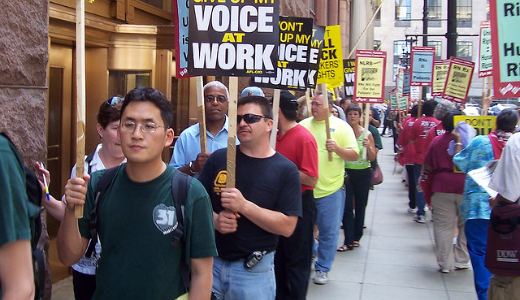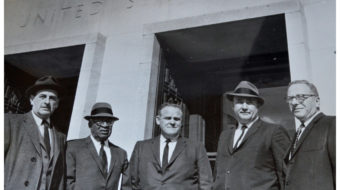
By now, there’s been publicity – and lots of management propaganda – about proposals by the National Labor Relations Board to change some rules governing union recognition elections, and particularly the campaigns that precede them.
Those campaigns often include rampant employer labor law-breaking, illegal firings, intimidation, spying and worse. The NLRB rules would not outlaw such abuses – but they would make the playing field more level by shortening the amount of time available to vicious and venal employers and their union-buster so-called “law firms” to institute such tactics.
But there are lesser and subtle employer abuses, and that’s what the NLRB rules would also curb. Here’s an example, courtesy of the Teamsters, of that type of under-the-radar employer abuse – abuse the agency’s new rules could potentially stop:
“In many cases, workers overwhelmingly want to join a union,” the union said in its formal statement on the NLRB’s proposals. “But employers are skilled at taking advantage of antiquated rules and preventing workers from benefiting from a collective bargaining agreement. They are able to waste the government’s resources with frivolous appeals.
“The Teamsters also support the proposed change that would defer eligibility issues until after the election if they involve less than a fifth of the workers in the bargaining unit. Changing this rule would eliminate many unfair challenges that are intended only to delay an election.
“Such challenges bogged down an election in 2003. On Nov. 18, Local 527S of the Graphic Communications International Union (now IBT’s Graphic Communications Conference) filed a petition to represent the 69 employees who bagged and delivered the Atlanta Journal-Constitution at the facility in Cumming, Ga.”
“The composition of that unit was challenged. The employer claimed the only appropriate unit was all 3,800-plus employees in the Atlanta Journal-Constitution circulation department located in 70 facilities scattered over 58,000 square miles.
“The board has never refused to apply its normal presumption in favor of a single location unit in favor of an integrated unit covering so many facilities in such a vast space. Nevertheless, a six-day hearing was conducted over nonconsecutive days,” the Teamsters continued.
That’s another employer stall: Drag out the hearing, giving the company more time to intimidate, harass, fire, and scare workers out of voting for the union. “On Jan. 23, 2004, the regional director directed an election at the single-facility Cumming location. Finally, on Feb. 6, a representation election was scheduled for Feb. 17, 91 days after the petition had been filed.”
The GCIU, now called the Graphic Communications Conference/Teamsters, was lucky. For years, in such cases, a series of 91 cases was relatively short. We’ve known of elections that were delayed, thanks to company and union-buster legalisms, for years.
“The board’s proposed rules would have prevented this delay,” the Teamsters continued. “The issues could have been resolved after the election. If the employer’s challenge was upheld, the union would have walked away. If the employer’s challenge was denied, the ballots could then have been counted. The board’s proposal to take the uncertainty of scheduling a date for a representation election out of the equation is laudable. It will provide unions, employers, and employees with much-needed guidance and predictability as to what will occur from the filing of a petition for an election to the counting of the ballots.”
We could not have said it better.
Now, take that one instance of employer stalling – by challenging which workers should be voting – and multiply it by every circumstance you can think of, from size of the unit to who is on the payroll at the time to location of the voting booths to you name it. In one election involving Delta Airlines and the Flight Attendants, the company even tried to add some deceased attendants to the voting rolls.
It is easy to see why representation elections are delayed…and delayed…and delayed…and eventually denied, when the union or the workers lose members or hope.
The NLRB, said the Teamsters and other unions, has proposed “modest, common-sense changes that preserve due process and strengthen the secret ballot process…And they eliminate the uncertainty that costs so much in time, money and productivity.”
That’s the formal legal reason for changing the rules. But the real reason is to cut down employers’ opportunity to delay, delay, and deny workers’ rights.
Photo: Carlos Fernandez // CC 2.0










